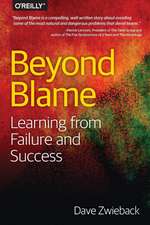Methods and Tools for Effective Knowledge Life-Cycle-Management
Editat de Alain Bernard, Serge Tichkiewitchen Limba Engleză Paperback – 19 oct 2010
| Toate formatele și edițiile | Preț | Express |
|---|---|---|
| Paperback (1) | 1231.01 lei 6-8 săpt. | |
| Springer Berlin, Heidelberg – 19 oct 2010 | 1231.01 lei 6-8 săpt. | |
| Hardback (1) | 1242.21 lei 6-8 săpt. | |
| Springer Berlin, Heidelberg – 7 apr 2008 | 1242.21 lei 6-8 săpt. |
Preț: 1231.01 lei
Preț vechi: 1501.23 lei
-18% Nou
Puncte Express: 1847
Preț estimativ în valută:
235.59€ • 245.04$ • 194.49£
235.59€ • 245.04$ • 194.49£
Carte tipărită la comandă
Livrare economică 14-28 aprilie
Preluare comenzi: 021 569.72.76
Specificații
ISBN-13: 9783642097188
ISBN-10: 3642097189
Pagini: 596
Ilustrații: X, 586 p.
Dimensiuni: 155 x 235 x 31 mm
Greutate: 0.83 kg
Ediția:Softcover reprint of hardcover 1st ed. 2008
Editura: Springer Berlin, Heidelberg
Colecția Springer
Locul publicării:Berlin, Heidelberg, Germany
ISBN-10: 3642097189
Pagini: 596
Ilustrații: X, 586 p.
Dimensiuni: 155 x 235 x 31 mm
Greutate: 0.83 kg
Ediția:Softcover reprint of hardcover 1st ed. 2008
Editura: Springer Berlin, Heidelberg
Colecția Springer
Locul publicării:Berlin, Heidelberg, Germany
Public țintă
ResearchCuprins
KM Needs and Concepts.- An Overview on Knowledge Management.- Manufacturing Knowledge Work: The European Perspective.- Building a Knowledge Share Culture in a Virtual Organization. Case Study for VRL-KCiP NoE.- Influence of Multi-Culturality in Virtual Teams.- A Web and Virtual Reality Based Paradigm for Collaborative Management and Verification of Design Knowledge.- Knowledge Management in the Virtual Enterprise: Web Based Systems for Electronic Manufacturing.- EDEN™.- Misunderstandings in Global Virtual Engineering Teams: Definitions, Causes, and Guidelines for Knowledge Sharing and Interaction.- A Knowledge Network Approach Supporting the Value Chain.- Formulating an Expertise Map in the VRL-KCiP.- Representation and Navigation Techniques for Semi-Structured Knowledge in Collaborating Communities.- The Use of Conceptual Maps for Competencies Mapping and Knowledge Formalization in a Virtual Lab.- Production Paradigms Ontology (PPO): a Response to the Need of Managing Knowledge in High-Tech Manufacturing.- KM Models, Methods and Tools.- Compatibility Knowledge in Fuzzy Front End.- Development of a Conceptual Reference Framework to Manage Manufacturing Knowledge Related to Products, Processes and Production Systems.- FBS-PPRE, an Enterprise Knowledge Lifecycle Model.- Knowledge Management for Industrial Heritage.- The Role of Knowledge Management in Supporting a Radical Innovation Project.- Improved Utilisation of Organisational Documents Using a Conceptual Framework.- Applications of Knowledge Engineering Approaches for Design.- Generation of Design Knowledge from Product Life Cycle Data.- Reference Architectures as Knowledge Management Tools Guiding and Supporting Enterprise Engineering.- Knowledge Networks, Methods and Tools Analysis for Information Validity: CaseStudy Feed Back.- Case in Manufacturing Knowledge Management.- Knowledge Management in a Virtual Lab Collaborative Training Project: A Mini-Formula Student Car Design.- Case Study in Design: Generation of Design Knowledge for Vehicle Sub-frames Based on Finite Element Simulation.- A Pragmatic Approach to Knowledge Management in an Engineering Design SME.- Capitalization and Reuse of Forging Knowledge in Integrated Design.- Case Study, USIQUICK Project: Methods to Capitalise and Reuse Knowledge in Process Planning.- Knowledge Management in Manufacturing Process Modeling: Case Studies in Selected Manufacturing Processes.- Knowledge Management Paradigms in Selected Manufacturing Case Studies.- Process Design Theory for Digital Information Services.- The VRL-KCiP Software Demonstration and Exchange Platform – An Example for Web-Based Knowledge Management and Representation.- A Basic Knowledge Management System for the VRL-KCiP.- Contacts and Appointments Manager: VRLshepherd.
Notă biografică
Prof. A. Bernard was graduated in 1982 at ENS Cachan. He contributed to LURPA laboratory since 1983 and obtained his PhD in 1989, on 3D feature-based manufacturing of forging dies. Then, as an assistant professor, he worked in Ecole Centrale Paris on product, technology and process modelling. He also created, in 1993, the rapid prototyping and reverse engineering platform of Ecole Centrale Paris, the CREATE. From September 1996 to October 2001, he has been Professor in CRAN laboratory in Nancy, where he managed a research group on mechanical and production engineering. Since 2001, he has been Professor in Ecole Centrale de Nantes. He was the Head of the "Industrial products and systems engineering" department for three years and he is now Deputy Director for Research of Ecole Centrale de Nantes. Concerning his recent research activities, he founded and was the Head of the "Virtual Engineering for industrial engineering" research team in IRCCyN laboratory for four years.
Prof. A. Bernard has been the vice-president of AFPR (French Rapid Prototyping Association) and its representative in GARPA (Global Alliance of Rapid Prototyping Associations) for 15 years. Since July 2003, he has been one of the members of the delegation for scientific evaluation at the French Ministry of Research for four years.
Prof. A. Bernard is member of national scientific committees and of professional and scientific international organizations. He is also member of the editorial board of six journals (Rapid Prototyping J, IJ PLM (Guest Editor Europe), IJ Product Development, IJ Numerical Engineering, Virtual and Physical Prototyping J, Academic J Manufacturing Engineering) and reviewer for others (CAD, Computers in Industry, CERA, Robotics and CIM, IJ CIM, J Engineering Manufacture, Engineering Applications of Artificial Intelligence, IEEE Transactions on Automation Science and Engineering, ASME Transactions Journal of Computing information Science in Engineering, IJ Design and Innovation Research, Mécanique et Industries, Document Numérique). Prof. Alain Bernard is an author who already published several books in Springer.
Prof. Serge Tichkiewitch is currently the General Director of the "Virtual Research Lab for a Knowledge Community in Production" Network of Excellence. He was the first general director of the French PRIMECA network, the former director of the Integrated Design team of the Soils, Solids and Structures Laboratory, composed of 40 persons, and the director of the Industrial Engineering and Management School of Engineers in Grenoble's Polytechnic Institute of Technology.
All the contributors are several of the main actors in Design and Manufacturing domain. Most of them are CIRP fellow members and have a strong experience in developing knowledge-based systems and services. This means that Knowledge Management has been implemented during industrial projects and the results/case studies are described and explained in different ways, key issues and strategic aspects, strong difficulties, main methodologies for success. The background of the co-authors is not only theoretical, it is also based on a strong application experience with collaborations that allowed developing new KM approaches in companies context.
Prof. A. Bernard has been the vice-president of AFPR (French Rapid Prototyping Association) and its representative in GARPA (Global Alliance of Rapid Prototyping Associations) for 15 years. Since July 2003, he has been one of the members of the delegation for scientific evaluation at the French Ministry of Research for four years.
Prof. A. Bernard is member of national scientific committees and of professional and scientific international organizations. He is also member of the editorial board of six journals (Rapid Prototyping J, IJ PLM (Guest Editor Europe), IJ Product Development, IJ Numerical Engineering, Virtual and Physical Prototyping J, Academic J Manufacturing Engineering) and reviewer for others (CAD, Computers in Industry, CERA, Robotics and CIM, IJ CIM, J Engineering Manufacture, Engineering Applications of Artificial Intelligence, IEEE Transactions on Automation Science and Engineering, ASME Transactions Journal of Computing information Science in Engineering, IJ Design and Innovation Research, Mécanique et Industries, Document Numérique). Prof. Alain Bernard is an author who already published several books in Springer.
Prof. Serge Tichkiewitch is currently the General Director of the "Virtual Research Lab for a Knowledge Community in Production" Network of Excellence. He was the first general director of the French PRIMECA network, the former director of the Integrated Design team of the Soils, Solids and Structures Laboratory, composed of 40 persons, and the director of the Industrial Engineering and Management School of Engineers in Grenoble's Polytechnic Institute of Technology.
All the contributors are several of the main actors in Design and Manufacturing domain. Most of them are CIRP fellow members and have a strong experience in developing knowledge-based systems and services. This means that Knowledge Management has been implemented during industrial projects and the results/case studies are described and explained in different ways, key issues and strategic aspects, strong difficulties, main methodologies for success. The background of the co-authors is not only theoretical, it is also based on a strong application experience with collaborations that allowed developing new KM approaches in companies context.
Textul de pe ultima copertă
Knowledge Management is a broad, critical and strategic issue for all companies. Indeed, knowledge is the key to competitiveness, for today’s competitive business environment requires reactivity, flexibility, agility and innovation. While knowledge itself is difficult to measure, it manifests itself in improved products, technologies and businesses.
Four years ago, based on the experience of many leading experts worldwide, CIRP (The International Academy for Production Engineering) decided to prepare and structure a proposal for a Network of Excellence. The European Community agreed to fund this NoE, with the aim of building a "Knowledge Community in Production." This aim was achievable because the NoE partners represented the most important universities in Europe and had strong partnerships with laboratories in distant locations, such as Japan, Australia, South Africa and the USA.
This book provides an understanding of what knowledge is and of why it is one of the most strategic issues in future manufacturing competitiveness, which will be based primarily on high-level technologies and innovative products.
The collective experience that contributed to the publication of this book is unique in that it is based on 34 complementary contributions that represent the state of affairs and current topics in Knowledge Management today. The book describes fundamental Knowledge Management concepts, methods and tools as well as concrete experiences which are presented and discussed. The specific European context and some sample cases from European manufacturing knowledge sharing also provide original added value to the book.
Four years ago, based on the experience of many leading experts worldwide, CIRP (The International Academy for Production Engineering) decided to prepare and structure a proposal for a Network of Excellence. The European Community agreed to fund this NoE, with the aim of building a "Knowledge Community in Production." This aim was achievable because the NoE partners represented the most important universities in Europe and had strong partnerships with laboratories in distant locations, such as Japan, Australia, South Africa and the USA.
This book provides an understanding of what knowledge is and of why it is one of the most strategic issues in future manufacturing competitiveness, which will be based primarily on high-level technologies and innovative products.
The collective experience that contributed to the publication of this book is unique in that it is based on 34 complementary contributions that represent the state of affairs and current topics in Knowledge Management today. The book describes fundamental Knowledge Management concepts, methods and tools as well as concrete experiences which are presented and discussed. The specific European context and some sample cases from European manufacturing knowledge sharing also provide original added value to the book.
Caracteristici
Latest research results in Knowledge Management Gives an actual and complete overview about strategic and operative Knowledge Management goals in theory and practice Description of many practical case studies in industry Includes supplementary material: sn.pub/extras












